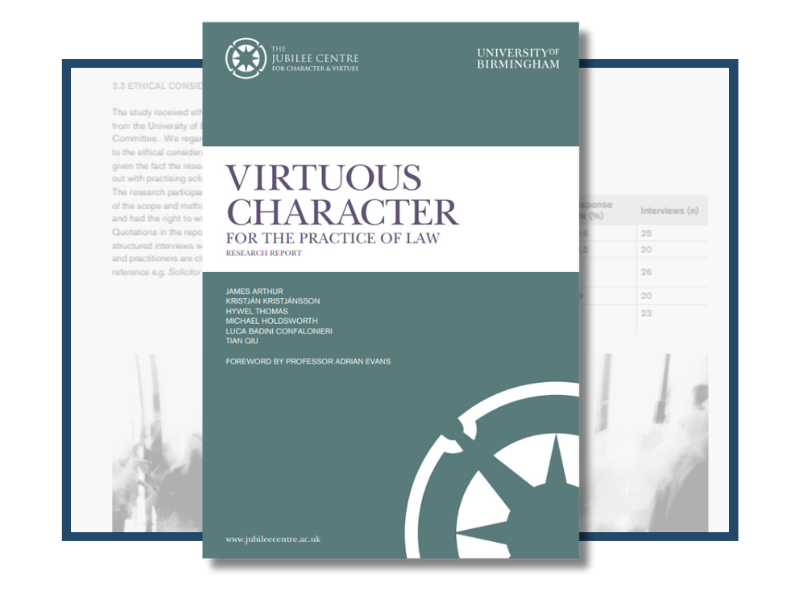Project Overview
The Virtuous Character for the Practice of Law research report was launched by Lord Neuberger, President of the Supreme Court, on Tuesday 25th November 2014, at the Supreme Court of the United Kingdom. The project was designed to deepen understanding of the place of virtues and values in initial education, training and subsequent professional practice in the legal profession in the UK. Being a lawyer calls on the qualities or virtues of individual character, but what virtues and values are held by lawyers and aspiring lawyers? How do personal and professional virtues shape practice; and what are the implications for ethics education in the profession?
Summary of Key Findings
- The character strengths of judgement, perseverance, perspective and fairness were deemed most important in an ‘ideal’ lawyer by respondents across all career stages. Judgement and honesty were selected by 84% of solicitors and 93% of barristers. Fairness and perseverance appeared in the top six choices for respondents selecting both ideal qualities and personal qualities.
- Morality is viewed by the majority of respondents as being at the core of being a good lawyer. However, some respondents expressed concerns about moral standards in the profession as a whole, e.g. in relation to tax law.
- Ethics education receives little attention in the curricula for undergraduate law students. At the vocational stage, ethics focuses narrowly on the application of professional codes of conduct.
- The vast majority of lawyers at all career stages indicated that they would perform dutifully in their responses to the ethical dilemmas. However, 16% of experienced solicitors indicated that they would take guidance from senior colleagues on ‘rounding up’ billing hours, even when it might be regarded as fraudulent.
- The findings indicate some constraints and anxieties about the maintenance of a virtuous character in the practice of law. Commercial factors were most frequently cited by those in practice as pressures, but the positive influence of good role models was considered effective in helping to deal with them.
- The data collected indicate that virtue ethics, in combination with other ethical perspectives, provides a useful theoretical lens through which to explore the ethics of legal practice.
Summary of Key Recommendations
- More time is needed for ethics education in undergraduate courses and in vocational training.
- Ethics education for the legal profession needs to embrace a variety of ethical theories, including virtue ethics, if students are to make sense of the moral nuances of being a good lawyer.
- The contribution of lawyers who are models of ethical character, reasoning and action need highlighting in the post-qualification training and CPD of lawyers, as much as those bringing commercial success.
- Greater attention must be given in legal practice to the influence of informal learning on workplace culture. Senior staff, role models and supervisors should work together to provide more opportunities for reflecting on ethics in their workplace.
Appendices
The Methodology included in the research report describes the overall design, and information and comments on participants. Other aspects of method, including instruments and their rationale, modes of quantitative and qualitative analysis, study limitations and further ethical considerations are included in the Extended Methodology.
Download the Extended Methodology below:

